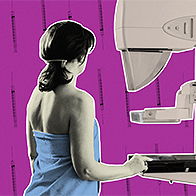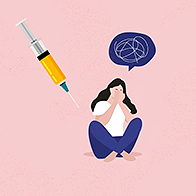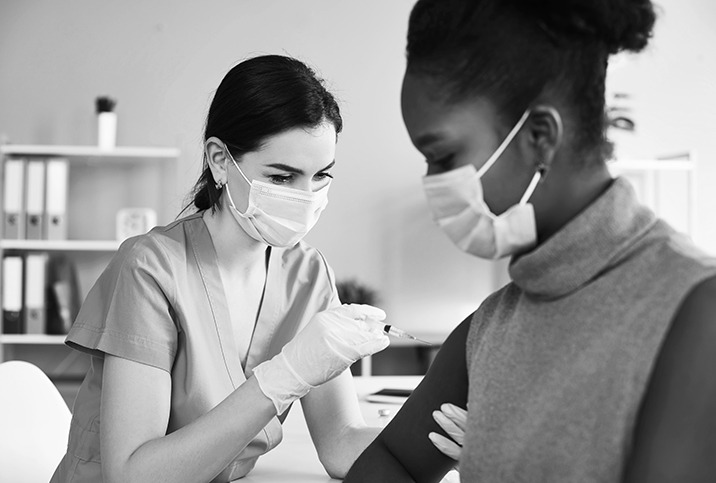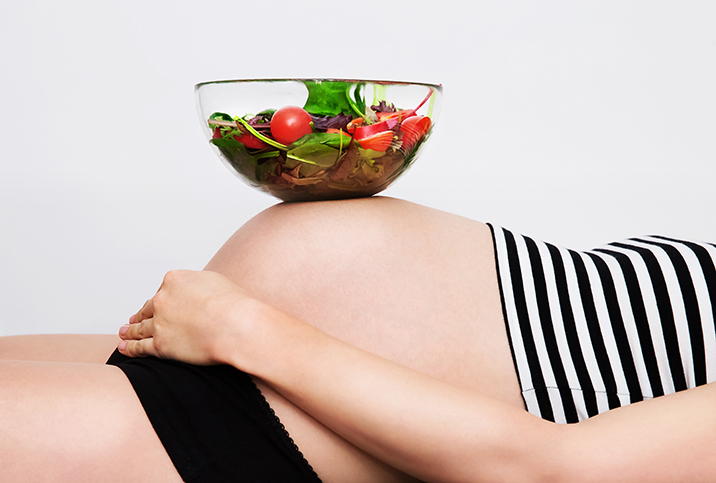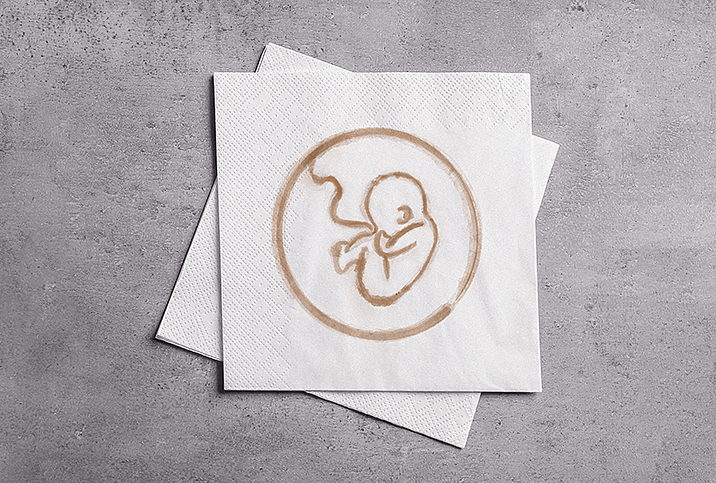Why More Pregnant People Aren't Getting COVID-19 Vaccines
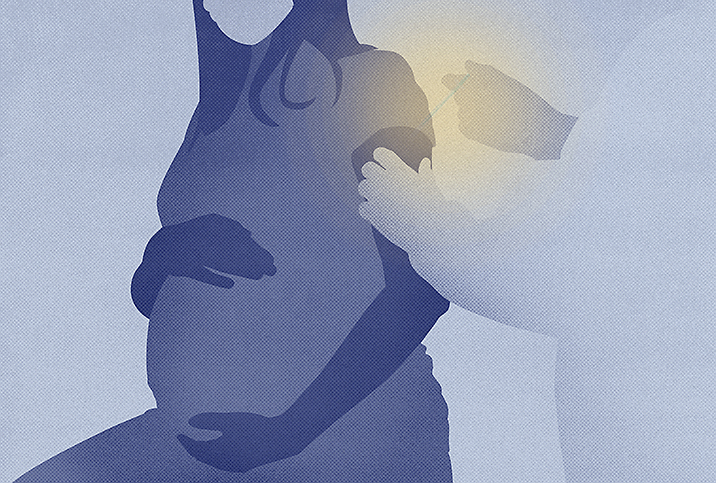
Christie McHugh is three months pregnant with her second child, and she has not yet received a COVID-19 vaccine.
"At the time the vaccines first became available, my husband and I had decided to begin trying for baby number two, and for that reason, I decided to wait to receive the vaccine," she said.
"This was a personal decision that we had made together, mostly because the vaccine was so new with minimal data. I had done a little research and talked with other soon-to-be moms as well, but I knew I just needed to trust my gut. It was difficult for me to decide because there were so many unknowns at the time, and I truly didn't know if I was making the 'right' decision."
McHugh is not alone in this. As of July 30, 2021, the American College of Obstetricians and Gynecologists (ACOG) reported that only 22 percent of pregnant women were fully vaccinated, according to data from the Centers for Disease Control and Prevention (CDC).
Those numbers may rise after the CDC announcement on August 11, 2021, that the COVID-19 vaccine is safe for pregnant people. CDC director Rochelle Walensky, M.D., said in an official statement that the "CDC encourages all pregnant people or people who are thinking about becoming pregnant and those breastfeeding to get vaccinated to protect themselves from COVID-19."
A recent study from the Journal of the American Medical Association (JAMA) showed that pregnant women face increased risks from COVID-19.
At the time of this writing, 4.62 billion doses of the COVID-19 vaccine have been given out globally, with 16 percent of the world being fully vaccinated. However, in the United States, the long-awaited solace from the pandemic might be approaching an abrupt, unexpected end as lawmakers reenter talks about mask requirements amid a recent spike in cases from the Delta variant of the virus.
Experts are urging people to get vaccinated to stop the spread of the virus as reopening procedures continue, but many people are still hesitant. After all, the vaccines are new and took only months to finish development—a much quicker turnaround compared to the years it normally takes.
With that speedy development cycle came concerns about whether the vaccines had undergone adequate testing and about any potential unknown, long-term side effects. Then, Johnson & Johnson's vaccine (Janssen) was put on pause while investigators looked into cases of blood clotting. Even though the pause was lifted only a short while later, the situation only added to the concerns over the vaccines' safety for those already on the fence.
"It is really tough to mention the 'v' word in today's world," said Betsy Greenleaf, D.O., FACOG. "Other than the word 'vagina,' I have found no other word so inflammatory as the word 'vaccine'.... In medicine, we always look at the risk-benefits ratio. Based on today's data, the risk of coronavirus greatly outweighs the risk of vaccine for all demographics, especially for mother and baby.
"Social media and the internet have connected our world in ways we have never been connected before," Greenleaf continued. "This is how rumors are able to spread at the speed of light. Here are some of the top rumors I hear on a daily basis from patients: The vaccine is going to cause infertility of the woman receiving it, [and] the vaccine causes birth defects."
The infertility claim stems from a false report spread by German anti-vaxxers who said a genetic code similarity shared between a spike protein found in SARS-CoV-2 and the placenta protein syncytin-1 could create a cross-reaction of immunity, rendering women infertile. There is no proof that the vaccines cause infertility. However, the story still spread on social media, leading many women to believe they shouldn't get vaccinated if they planned to conceive.
Beyond this, the FDA has only approved the vaccines for emergency use—they have not officially approved any of the vaccines. Without that seal of approval, some people are finding it challenging to have faith in the vaccines.
Education on what vaccines are could help assuage some fears. Greenleaf pointed to the theory of vaccines, calling them "the ultimate in biohacking." Basically, vaccines provide triggers for our body to create antibodies that combat disease—a process they already do naturally when we get sick.
The infertility claim stems from a false report spread by German anti-vaxxers.
The vaccines created by Moderna and Pfizer are messenger RNA vaccines (mRNA), which teach our cells how to construct a protein that triggers an immune response in the body. The body then creates antibodies to combat the virus. Scientists have been studying mRNA for decades, and the COVID-19 pandemic offered them the opportunity to use mRNA technology to develop vaccines. The FDA and CDC consider all three vaccines safe, including the one created by Johnson & Johnson, which uses a different, disabled adenovirus.
Greenleaf reassured that there haven't been any known problems arising with pregnant women or their babies due to getting vaccinated, based on data collected over the past year. That being said, she also encouraged women to opt for the Moderna or Pfizer mRNA vaccines. "My concern is that pregnancy itself is already a hypercoagulable state, more prone to blood clots. There is no proof that the Johnson & Johnson vaccine is unsafe in pregnancy, but it is my opinion that if a woman has another choice on vaccine manufacturer, why not use the other vaccines?"
A recent study from the Journal of the American Medical Association (JAMA) showed that pregnant women face increased risks from COVID-19. According to the study, pregnant women who contract the virus have a 76 percent greater risk of pregnancy-induced high blood pressure (preeclampsia or eclampsia), are five times as likely to require intensive care and are three times as likely to have a severe infection, as compared to uninfected women. Thirteen percent of the children born to infected women tested positive for the virus, and C-section deliveries showed a higher likelihood of transmission. Preterm birth is another risk for infected pregnant women. Women who test positive for COVID-19 show a 60 percent to 90 percent increased risk of having a preterm birth. For women suffering from hypertension, diabetes and/or obesity, the risk of preterm birth rises to 160 percent.
As McHugh told me, she will be speaking with two doctors from her OB-GYN soon to decide if vaccination is the best option for her. "I'm now at the end of my first trimester," she said. "My biggest concern would obviously be the health and safety of my unborn baby.
"With so many social media sources right at our fingertips," McHugh said, "it's hard to believe the accuracy of anything you find online. In my opinion, your doctor will always have the resources that you need."







